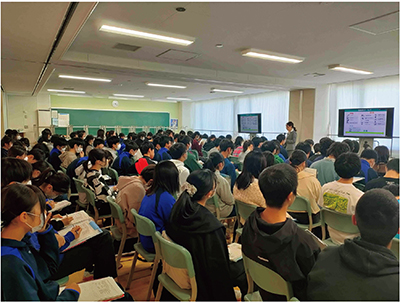(2) Efforts on Information Disclosure and the Promotion of Public Understanding and Support
In today’s globalized world, Japan and developing countries are in a relationship of mutual support. Japan’s ODA is of great significance as a critical effort by Japan to contribute to the peace and prosperity of the world, including developing countries, and thereby defend Japan’s national interests. Since ODA is funded from the public resources of the people of Japan, it is crucial to communicate the significance and efforts of development cooperation in an easily understandable manner, and to gain the recognition and support of a wide range of people in the country. It is also important that Japan’s efforts be properly understood overseas in order to enhance friendly bilateral relationships and Japan’s credibility in the international community. From these perspectives, ODA public relations are becoming increasingly important. Furthermore, to promote collaboration with a wide range of stakeholders, including private companies, local governments, and NGOs, it is essential to raise awareness and get many people involved.
The Government of Japan undertakes various efforts in public relations and information dissemination on ODA.
A. Strengthening Public Relations and Information Dissemination
MOFA strives to conduct more effective ODA public relations, in cooperation with JICA. Domestically, MOFA focuses on publicizing its policies, using specific measures to reach young people and small and medium-sized enterprises in rural areas that are not very familiar with ODA. The measures include posts on ODA websites, social media, and YouTube channels, email newsletters, videos, public relations events, and ODA Delivery Lecture series. For example, MOFA has created a TV drama under the theme of disaster risk reduction, featuring TV personality and author Mr. MATAYOSHI Naoki, and documentary videos titled “Japanese Women Delivering Hope in a World of Uncertainty,” with freelance announcer Ms. NAKANO Minako as the presenter. These public relations activities are intended to communicate respective themes to the public in easily understandable and accessible manners by featuring well-known personalities. As a joint public relations effort not only by MOFA and JICA but also by other parties involved in development cooperation in Japan, MOFA, together with JICA and the Japan NGO Center for International Cooperation (JANIC), holds one of the largest events on international cooperation in Japan called “Global Festa JAPAN” every year around the time of International Cooperation Day (October 6) (see “ODA Topics” for details on the specific initiative). MOFA also puts efforts into public relations through International Cooperation Delivery Lectures, in which former JOCVs and JICA-related workers share their experiences as lecturers, and through ODA field visits for officials of local public entities, mobilizing JICA’s 15 offices across Japan.
Overseas, Japan is committed to increasing the visibility of its cooperation. For example, Japanese embassies in developing countries, etc. have local media organizations report on ODA project sites, create public relations materials in local languages, and display Japan’s national flag on equipment and facilities donated or built by Japan. Furthermore, ambassadors and Consuls-General of Japan themselves frequently post on X (formerly Twitter) and Instagram to improve the understanding of local people about Japan’s ODA.
In the White Paper on Development Cooperation published annually, MOFA aims to make its contents easy and interesting to read, by featuring many photos and stories from the field, and strives to ensure transparency on the implementation status of ODA with relevant statistical data. The White Paper is also published in both English and Japanese. As a result of these efforts, public response to various public relations tools has steadily increased, as shown by the number of participants in Global Festa JAPAN, the number of ODA Delivery Lectures, and the number of views of posted ODA-related videos. Japan is committed to continuously strengthening public relations even further.
B. Information Disclosure on Implementation and Evaluation of ODA
The Government of Japan set up the “ODA Mieru-ka Site”Note 35 (a website designed to visualize ODA) on the JICA website, and makes available to the public ODA project summaries, results, ex-ante/ex-post evaluations, and other related information.
Likewise, the MOFA website features the results of policy- and program-level ODA evaluationsNote 36 and other related information, in addition to new ODA projects and statistical materials, for more effective implementation and the promotion of public understanding and support for ODA.
C. Promotion of Development Education

ODA Delivery Lecture given by a MOFA official
MOFA holds the “ODA Delivery Lecture” series, in which MOFA officials provide explanations on international cooperation, including ODA, at educational institutions, NGOs, and other organizations in Japan. Over the past eight years, a total of 224 ODA Delivery Lectures have been organized with the involvement of approximately 24,000 participants, mainly students. JICA also promotes cooperation with ex-JOCVs and local boards of education, and holds International Cooperation Delivery Lectures conducted by JICA trainees staying in Japan. In FY2022, approximately 1,700 lectures were held and attended by approximately 150,000 participants. Other efforts to promote understanding and participation in international cooperation include “Visit JICA,” in which students can visit JICA offices in Japan, and the “JICA Essay Contest on International Cooperation for Junior and Senior High School Students.” JICA also manages the exhibition facility “JICA Global Plaza.”
D. Promotion of Discussion and Dialogue
The Government of Japan holds information sessions for NGOs, companies, business associations, and others on how to utilize ODA in respective activities. In addition, the government organizes public lectures on international trends and Japan’s efforts in international cooperation, providing opportunities for dialogue with the public interested in diplomacy and ODA.
- Note 35: ODA Mieru-ka Site https://www.jica.go.jp/oda/ (in Japanese only)
- Note 36: ODA evaluations https://www.mofa.go.jp/policy/oda/evaluation/index.html
